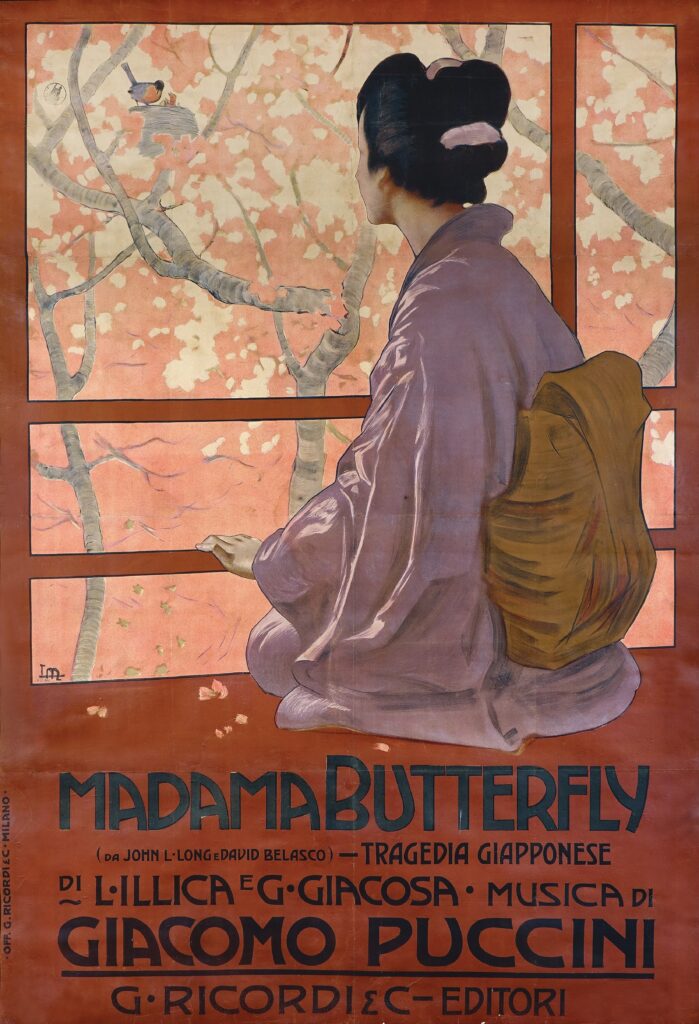
Leopoldo Metlicovitz, 1904, credit Wikipedia
Madama Butterfly from WNO
A bold new Madama Butterfly by Giacomo Puccini, from WNO in Cardiff, at Wales Millennium Centre, Saturday 2nd October 2021, reviewed by David Truslove
Welsh National Opera’s return to live performance ushers in Lindy Hume’s strikingly modern Madama Butterfly. Silk screens and sliding panels associated with Joachim Hertz’s traditional staging, in place since 1978, now move aside for Isabelle Bywater’s dazzlingly white cubes set on a revolve. This neon-lit slice of minimalism does for Butterfly’s executive suite. Bedroom and shower loom over kitchen and utility room, a deliberately misshapen apartment conjuring not so much comfortable domesticity, but chilling alienation. Its strong visual impact artfully situates the audience as voyeurs to Butterfly’s naivety and disintegration which Hume likens to an “exquisite sadism”.
Given the heated discussions whether much-loved operas should be jettisoned if they affront modern sensibilities, Hume has removed specific Japanese references and historically contentious imperialism. Everything is rerouted to engage with contemporary obsessions on coercion, sexual exploitation and human trafficking. She has ditchedNagasaki for a more culturally neutral space, creating what she loftily claims is an alternatively “imagined biosphere”, an unspecific location in a “dystopic near-future version of our own society”. By these means she smooths away cultural stereotypes that have enraged those who, like the musicologist Susan Clary, want to “pin this opera up in the museum of strange cultural practices of the past”.
For all the universalising of Hume’s vision, the work’s gritty realism and Butterfly’s human tragedy remains intact. Her staging is wonderfully lit by Elanor Higgins’ ice cold blues, their crisp edges (like the set) relieved by Bywater’s outréwomen’s costumes for Act One (beehive hairdos, frilly dresses and white boots) straight from the pages of Playboy – exploitation never more explicit. Butterfly’s bridal outfit has echoes of Georgia O’Keeffe’s orificial irises, her gaping skirt as flagrant a sexual message as you could want. Eye-catching and grotesque, it spells commodity with capital letters. But it also reinforces a dislocation between Puccini’s beautifully conceived score and the squalor of a service industry intended for wealthy clients.
In the title role, Joyce El-Khoury (who alternates with Alexia Voulgaridou) is a more chirpy than coy fifteen-year-old. Any sense of an emotional journey from innocent girl to young married mother is reduced by a calculating self-assurance. It doesn’t help that this Cio-Cio-San is taller than Peter Auty’s casual but very credible and ardently sung Pinkerton. But the two deliver a marvellously fervent wedding night duet, its seductive music never more radiant. Hers is a voice of considerable strength across the range, if slightly hard at the top when passionate, but magnificently supported when needing to float. The naivety of her ‘Un bel dì, vedremo’ is as glorious as it is painful.
Elsewhere, Kezia Bienek, a frustrated Suzuki, over-eggs her stress in Act Two as she rages over Butterfly’s self-delusion. A certain stridency in her rich mezzo aside, the Flower Duet was a joy. Mark Stone’s benevolent but ultimately impotent consul Sharpless is well projected as is his warm baritone. Cameo appearances from Tom Randle as a man-about-town Goro, Keel Watson as an authoritative Bonze and Neil Balfour as the rejected Prince Yamadori are all well- judged. Sophie Yelland (standing in for an indisposed Sian Meinir) draws some sympathy for her hesitant Kate Pinkerton.
Expansive emotions are superbly realised via the chorus and orchestra of WNO under the helm of conductor laureate Carlo Rizzi. He consistently illuminates Puccini’s lavish score with polished and at times elemental playing. Whatever feelings one may have towards Hume’s radical makeover, Puccini’s music carries its own dramatic force that is as indestructible and compelling as ever.
Performances continue through October to December in Plymouth, Birmingham, Bristol, Southampton, Oxford and Llandudno











No excuse for the spreading political transformation of western drama and art merely into propaganda vehicles for “anti-racism”, “transgenderism” and so forth, however ridiculous a black Anne Boleyn or a moustachioed Jenny Seagrove or a non-white androgyne Hamlet may look. And I think Sir Lenworth Henry CBE’s Afrohaircut looks especially ridiculous, though it might go with a Red Nose, so come on Pc Plod arrest me for saying so.
“Sir” Lenny used to be a well-liked and competer actor, but his new role as Black Champion has now taken the form of multi-racializing the specifically English epic of Tolkien. He was quoted some time ago “celebrating” the reduction of cis-gendered heterosexual white males to a numerical minority (and therefore helplessly powerless). We used to laugh with him, and now we should laugh AT him – except that his media-activism is no laughing matter, any more than his Celebrity Worth that exceeds £6 million.